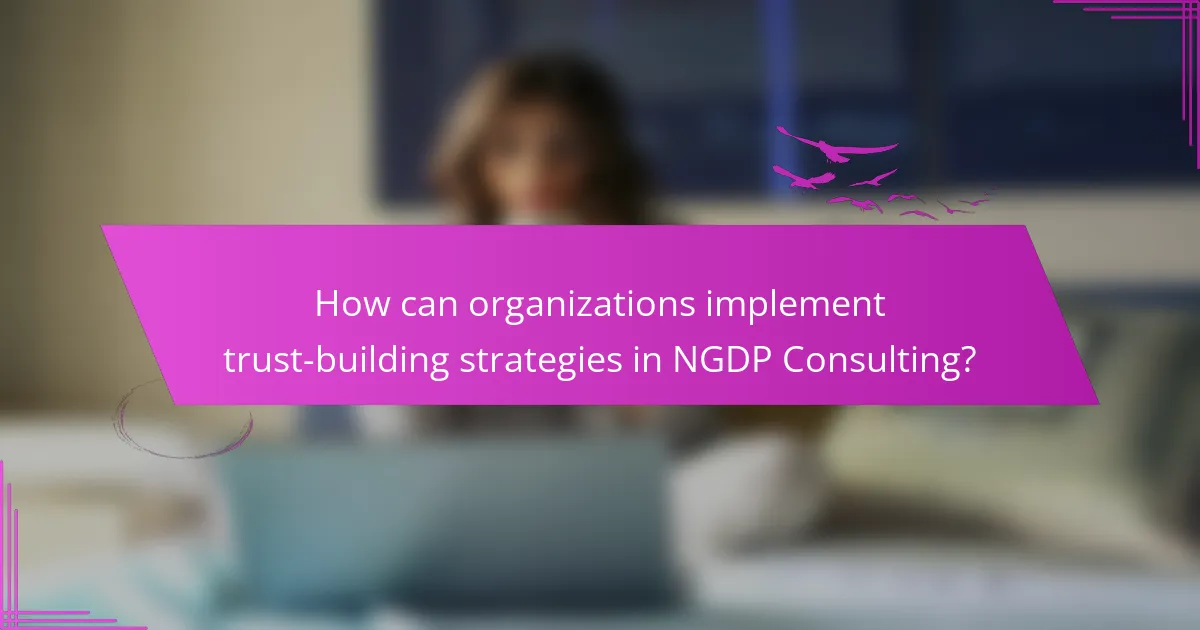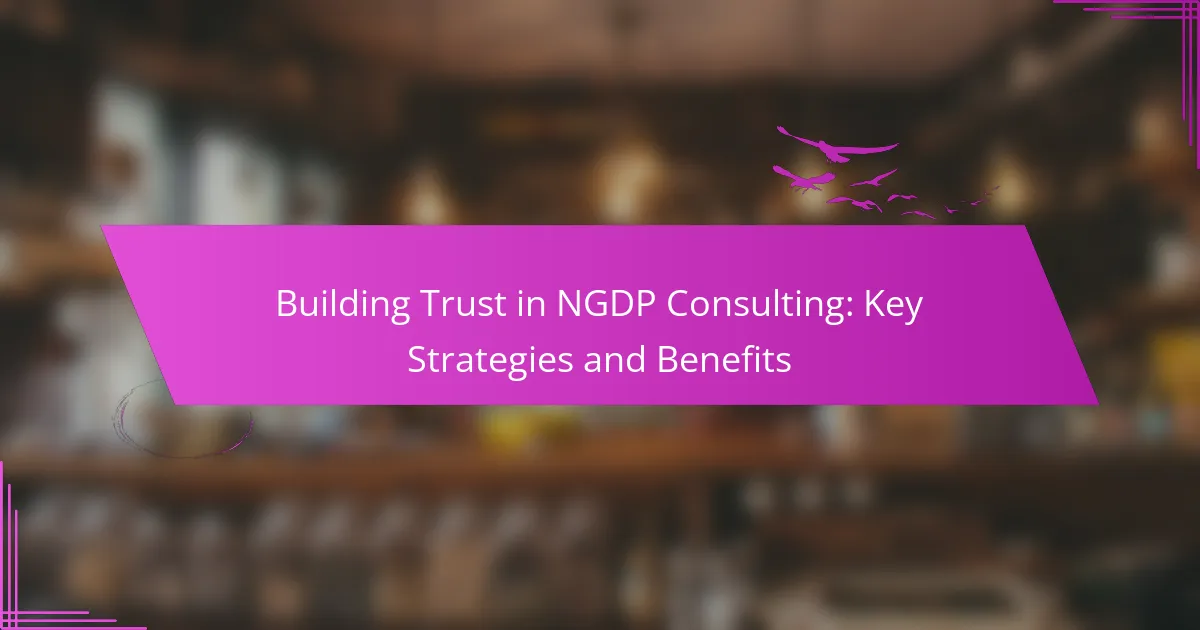
What is NGDP Consulting and Why is Trust Important?
NGDP Consulting is a firm that specializes in providing strategic advice and management solutions. It focuses on helping organizations improve their performance and achieve their goals. Trust is crucial in NGDP Consulting because it fosters open communication and collaboration. When clients trust their consultants, they are more likely to share vital information and insights. This transparency leads to better decision-making and more effective strategies. According to a study by the Harvard Business Review, trust enhances team performance and client satisfaction. Thus, building trust is essential for successful consulting engagements.
How does trust impact the effectiveness of NGDP Consulting?
Trust significantly enhances the effectiveness of NGDP Consulting. When clients trust the consulting firm, they are more likely to share critical information. This openness leads to better insights and tailored strategies. Trust also fosters collaboration between the consulting team and the client. A strong trust relationship can lead to increased client satisfaction and loyalty. Research indicates that trust improves communication and reduces misunderstandings. Consequently, projects are completed more efficiently and effectively. Trust in NGDP Consulting ultimately results in better outcomes for clients.
What are the key elements that contribute to building trust in consulting?
Key elements that contribute to building trust in consulting include transparency, expertise, communication, and reliability. Transparency involves sharing information openly with clients. This fosters an environment of honesty and integrity. Expertise is crucial as clients seek consultants with proven knowledge and skills. Demonstrating competency builds confidence in the consultant’s abilities.
Effective communication is necessary to ensure clients feel heard and understood. Regular updates and feedback create a collaborative atmosphere. Reliability refers to consistently delivering on promises and meeting deadlines. This establishes a track record that clients can depend on. Together, these elements create a foundation of trust that enhances consulting relationships.
How does trust influence client relationships in NGDP Consulting?
Trust is a fundamental element that significantly influences client relationships in NGDP Consulting. It fosters open communication between consultants and clients. This open communication leads to better understanding of client needs. When clients trust their consultants, they are more likely to share critical information. This transparency enhances the quality of solutions provided. Trust also encourages long-term partnerships. Clients who trust NGDP Consulting are more likely to return for future projects. Research shows that organizations with high trust levels experience greater client satisfaction and loyalty. This ultimately contributes to the firm’s reputation and success in the consulting industry.
What are the core strategies for building trust in NGDP Consulting?
The core strategies for building trust in NGDP Consulting include transparency, consistent communication, and delivering on promises. Transparency involves openly sharing information about processes and decision-making. This fosters an environment where clients feel informed and valued. Consistent communication ensures that clients are regularly updated on project progress and any potential challenges. This builds a sense of reliability. Delivering on promises is crucial; meeting deadlines and achieving stated goals reinforces credibility. Research shows that 75% of clients value reliability in consulting relationships. These strategies collectively enhance trust and foster long-term partnerships in consulting.
How can transparency enhance trust between consultants and clients?
Transparency enhances trust between consultants and clients by fostering open communication and accountability. When consultants share information about their processes, methodologies, and decision-making, clients feel more informed and involved. This openness reduces uncertainty and builds confidence in the consultant’s expertise. Research indicates that organizations with transparent practices experience higher levels of client satisfaction. For instance, a study by the Institute for Public Relations found that transparency positively correlates with trust. By demonstrating honesty in their operations, consultants can create a stronger, more trusting relationship with their clients.
What role does communication play in establishing trust?
Communication is essential in establishing trust. Clear and transparent communication fosters understanding between parties. It allows individuals to express their thoughts and feelings openly. This openness creates a safe environment for dialogue. When people feel heard, they are more likely to trust one another. Active listening is a critical component of effective communication. It demonstrates respect and validation of others’ viewpoints. Research shows that consistent communication enhances relationship satisfaction. Trust is built over time through repeated positive interactions. Therefore, effective communication is a foundational element in developing trust.
How can consistent performance build client confidence?
Consistent performance builds client confidence by demonstrating reliability and competence. When clients see consistent results, they develop trust in the service provider’s abilities. This trust is crucial for long-term relationships. According to a study by the Harvard Business Review, companies that deliver consistent performance experience higher client retention rates. Clients are more likely to recommend services that meet their expectations consistently. Additionally, consistent performance reduces client anxiety regarding outcomes. This leads to stronger partnerships and increased satisfaction. Ultimately, reliability fosters a sense of security in clients, reinforcing their decision to engage with the service provider.

What are the benefits of building trust in NGDP Consulting?
Building trust in NGDP Consulting enhances client relationships and fosters long-term partnerships. Trust leads to increased client loyalty and repeat business. It encourages open communication, allowing for better understanding of client needs. Trust also promotes transparency, which can lead to more effective collaboration. Clients are more likely to share valuable insights when they trust their consultants. This can result in tailored solutions that better meet client objectives. Additionally, a strong reputation for trustworthiness can attract new clients through referrals. According to a study by Edelman, 81% of consumers need to trust a brand to buy from them. This statistic underscores the importance of trust in consulting relationships.
How does trust lead to better client outcomes?
Trust leads to better client outcomes by fostering open communication and collaboration. When clients trust their consultants, they are more likely to share critical information. This transparency allows consultants to tailor solutions that meet specific client needs. Studies show that trust enhances client satisfaction and loyalty. According to a report by the Institute of Management Consultants, firms with high trust levels see a 30% increase in repeat business. Trust also reduces misunderstandings and conflicts, leading to smoother project execution. Overall, trust facilitates a productive partnership that drives successful results.
What are the long-term advantages of trust in consulting relationships?
The long-term advantages of trust in consulting relationships include enhanced collaboration and improved communication. Trust fosters an environment where clients feel comfortable sharing vital information. This openness leads to more tailored solutions that meet specific needs. Additionally, trust can result in greater client retention rates. A study by the Harvard Business Review found that organizations with high trust levels enjoy 50% higher employee engagement. Trust also encourages innovation, as teams are more likely to experiment with new ideas. Furthermore, it can lead to increased referrals and business opportunities. Overall, trust significantly contributes to sustained success in consulting engagements.
How can trust contribute to client retention and loyalty?
Trust significantly enhances client retention and loyalty. When clients trust a consulting firm, they are more likely to continue using its services. Trust reduces perceived risk in decision-making. Clients feel assured that their needs will be met effectively. According to a study by the Harvard Business Review, companies with high trust levels see a 50% increase in client retention. Trust fosters open communication, allowing for better understanding of client needs. This leads to tailored solutions that reinforce client satisfaction. Ultimately, trust creates a strong emotional connection that encourages long-term relationships.
What are the specific challenges in building trust in NGDP Consulting?
Building trust in NGDP Consulting faces several specific challenges. One challenge is the perceived lack of transparency in consulting processes. Clients often seek clear communication regarding methodologies and outcomes. Another challenge is establishing credibility due to the competitive nature of the consulting industry. Many firms offer similar services, making it difficult for NGDP Consulting to stand out. Additionally, inconsistent client experiences can undermine trust. If past clients report varying levels of satisfaction, potential clients may hesitate to engage. Lastly, managing client expectations is crucial. If NGDP Consulting fails to meet promised deliverables, it can lead to distrust. Each of these challenges highlights the importance of clear communication, consistent service quality, and effective expectation management in building trust.
How can consultants overcome barriers to trust with clients?
Consultants can overcome barriers to trust with clients by establishing clear communication. Open dialogue fosters transparency and encourages client engagement. Regular updates on project progress help clients feel informed and valued. Demonstrating expertise through case studies and testimonials builds credibility. Additionally, actively listening to client concerns shows respect for their opinions. Building personal relationships through informal interactions can enhance rapport. Setting realistic expectations prevents misunderstandings and disappointments. Finally, honoring commitments consistently reinforces reliability and trustworthiness.
What common pitfalls should be avoided when trying to build trust?
Common pitfalls to avoid when trying to build trust include inconsistency and lack of transparency. Inconsistency can lead to confusion and skepticism. When messages or actions vary, trust diminishes. Lack of transparency creates suspicion. Clients prefer clear communication about processes and decisions. Overpromising and underdelivering also erodes trust. Failing to meet commitments damages credibility. Additionally, ignoring feedback can alienate clients. Engaging with their concerns fosters trust. Finally, being defensive in discussions can hinder trust. Open dialogue encourages a trusting environment.

How can organizations implement trust-building strategies in NGDP Consulting?
Organizations can implement trust-building strategies in NGDP Consulting by fostering transparency and open communication. Establishing clear expectations from the beginning builds a foundation of trust. Regular updates and feedback loops enhance collaboration and accountability. Training staff in empathy and active listening skills promotes a supportive environment. Additionally, sharing success stories and testimonials boosts credibility. Consistent follow-through on commitments reinforces reliability. Monitoring and addressing concerns promptly demonstrates responsiveness. These strategies collectively contribute to a culture of trust within NGDP Consulting.
What practical steps can be taken to foster trust in consulting?
Establishing clear communication fosters trust in consulting. Regular updates and transparent discussions help clients feel informed. Setting realistic expectations builds credibility. Delivering on promises reinforces reliability. Demonstrating expertise through case studies enhances confidence. Active listening shows respect and understanding of client needs. Building relationships through personal interactions strengthens rapport. Seeking feedback allows for continuous improvement and shows commitment.
How can training and development enhance trust-building skills?
Training and development enhance trust-building skills by providing structured learning experiences. These experiences teach individuals effective communication techniques. Improved communication fosters transparency and openness, essential for building trust. Training also includes role-playing scenarios that simulate trust-building situations. This practice helps individuals understand others’ perspectives better. Development programs often incorporate feedback mechanisms to promote self-awareness. Self-awareness is crucial for recognizing and addressing trust issues. Research indicates that organizations with strong training programs see a 30% increase in employee trust levels. Therefore, effective training and development directly contribute to enhanced trust-building skills.
What tools and frameworks can support trust-building initiatives?
Trust-building initiatives can be supported by various tools and frameworks. Key frameworks include the Trust Equation, which emphasizes credibility, reliability, intimacy, and self-orientation. The Trust Model by Mayer, Davis, and Schoorman identifies ability, benevolence, and integrity as essential components of trust. Tools like stakeholder mapping facilitate understanding of trust dynamics among parties. Surveys and feedback mechanisms gauge trust levels and identify areas for improvement. Additionally, communication platforms enhance transparency, fostering trust through open dialogue. These frameworks and tools have been validated through studies in organizational behavior, demonstrating their effectiveness in enhancing trust.
What best practices should be followed for effective trust-building in NGDP Consulting?
Effective trust-building in NGDP Consulting requires transparency, consistency, and open communication. Transparency involves sharing relevant information with clients to foster understanding. Consistency builds reliability through delivering on promises and maintaining quality. Open communication encourages feedback and addresses concerns promptly. Establishing clear expectations helps prevent misunderstandings. Demonstrating expertise through knowledge-sharing enhances credibility. Building personal relationships strengthens connections and fosters loyalty. Lastly, actively listening to client needs shows respect and commitment to their success. These practices collectively create a trustworthy environment that enhances client relationships in NGDP Consulting.
How can feedback mechanisms improve trust and communication?
Feedback mechanisms enhance trust and communication by creating open channels for dialogue. These mechanisms allow individuals to express their thoughts and concerns. When feedback is actively sought and addressed, it fosters a sense of inclusion. This inclusion leads to increased transparency in decision-making processes. Research indicates that organizations with robust feedback systems report higher employee engagement. Engaged employees are more likely to trust their leaders and colleagues. Moreover, timely feedback helps clarify expectations and reduce misunderstandings. This clarity strengthens relationships and promotes a collaborative environment.
What role does ethical behavior play in sustaining trust over time?
Ethical behavior is crucial for sustaining trust over time. It establishes a foundation of integrity and transparency. Organizations that consistently demonstrate ethical practices foster reliability among stakeholders. This reliability encourages long-term relationships with clients and partners. Research indicates that 81% of consumers prefer to buy from companies they trust. Ethical behavior also mitigates risks associated with reputational damage. Companies known for ethical standards often experience higher employee morale and loyalty. This internal trust translates into better service and client satisfaction. Therefore, ethical behavior directly influences the longevity of trust in business relationships.
NGDP Consulting is a firm dedicated to providing strategic advice and management solutions to enhance organizational performance. Trust plays a vital role in the consulting process, fostering open communication and collaboration, which leads to improved decision-making and client satisfaction. This article outlines the key strategies for building trust in consulting relationships, such as transparency, consistent communication, and reliability, while also discussing the benefits of trust, including increased client loyalty and better outcomes. Additionally, it addresses challenges in trust-building and offers practical steps organizations can take to implement effective trust-building initiatives.
